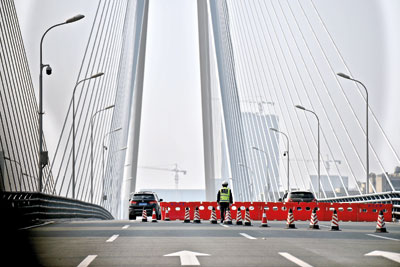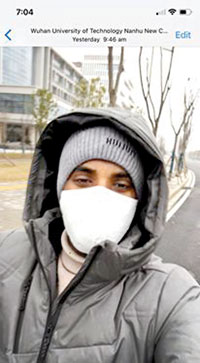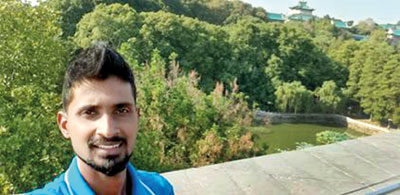News
Living hell for families of Lankan students holed up in coronavirus ground zero

A policeman mans a checkpoint blocking access across a bridge to the city of Wuhan. AFP.
Thankfully, it happened during the Chinese New Year.
University students or teachers who had chosen to remain in their Wuhan hostels and apartments while the sprawling city emptied out for the holidays had stocked up on at least two weeks of provisions. As it happens here during the Sinhala and Tamil New Year, entire metropolises in China decamp to their homes or go on travel during this traditional festival.

Prageeth Roshan Weerathunga, a Sri Lankan student on the streets of Wuhan
Among those who stayed back were 33 Sri Lankans. Some had remained because their courses were nearly over. Others had assignments to complete over the vacation. Still more had only just returned from Sri Lanka and it was too soon to go again.
Now, holed up in their rooms or studio apartments as a virulent illness raged outside, they tried to remain optimistic. Their main distraction was speaking frequently with their worried families back home. But if they were not evacuated soon, their food would run out and they were afraid to eat what their universities were offering.
The Sri Lankans were at the centre of intense diplomatic negotiations between Colombo and Beijing over the past week. Like everyone else, they were trapped in Wuhan as the novel coronavirus forced it to go into lockdown.
Yesterday, they finally came home. But it has been a stressful, even depressing, few days. The families with young children–there were three among the group–found it particularly difficult to keep their spirits up.
Wuhan, the capital of the Hubei Province, is big and diverse, with half of Sri Lanka’s population. It is well connected with railways, roads and expressways connecting to other major cities. The universities are massive. Campuses are situated several kilometres from each other within the same premises.
Sandeepani, the 26-year-old daughter of former Royal College Warden Aruna de Silva, 64, was at the Hubei University of Science and Technology. She was a fluent Chinese speaker, having lived there initially for five years to study international economics and trade before returning for her post-graduate degree.
Mr de Silva is the General Secretary of the Sri Lanka-China Buddhist Friendship Society. His daughter had attended a wedding in Sri Lanka and gone back to Wuhan on December 9. She stayed there to work on a paper throughout the holidays.
“She first heard about a virus around January 18 or 19 but then it died down,” Mr de Silva said. “And not even the Chinese knew at the time that had started in Wuhan. They thought it was in the South.”
Then it was found the virus may have its origins in Huanan Seafood Market in Wuhan. First, a warning was issued not to eat seafood. “I still didn’t take it seriously but I did tell her to buy a ticket and come home,” Mr de Silva said. “The second option was to travel to Shanghai where we had friends.”
Sandeepani bought a plane ticket to Shanghai to travel on January 22 but decided against it because the airport was too crowded. “She figured she was more at risk because she would be exposed on the way to the airport, at the airport and in the flight,” Mr de Silva said. “During that time of year, you can’t stick a finger into any mode of transport in China. It’s that crowded.”

Kasun posted regularly on Facebook
Around five million people had already left Wuhan. The authorities stopped another two to three million from going out after the virus was confirmed.
“She said she’s safer in her hostel,” Sandeepani’s father continued. On the 23rd, the city went into lockdown. Nobody was allowed in or out. In her campus, there were two more Sri Lankans. All of them had single rooms. And in all the days they were confined to their quarters, they did not see each other.
While the single students did not have serious issues with food, it was the families that fretted. Not only were they afraid of running out, they were scared to put a foot out in case they brought the virus back and their kids caught it.
“Even to dispose of the garbage, they would open the door a crack, put it out and close the door again,” said the relative of a three-member family there. “They were that afraid. They just locked themselves in and waited.”
Their daughter was just seven-years-old. Her father went to Wuhan for a PhD and her mother was a teacher. They had been there for two-and-a-half years and lived in a studio apartment. The relative did not wish to be named and requested that the family members’ names are also left out.
The mother of 28-year-old Kasun Chamara Wickramage’s had been crying all morning on Friday. She had read a letter her son had written to a Sinhala language newspaper and it had made her sad. Kasun posted regularly on Facebook, too.
M Kusumawathie, 52, lives in a remote village called Gamakanda in Embilipitiya. Her husband worked in a school. She had a small grocery and clothes shop. But her two children–she also has a daughter–both won scholarships to China by dint of their hard work.
Kasun went to China in August last year to study technology at the Wuhan University. He is a graduate of the Uva Wellassa University. His sister studied fisheries and marine sciences before him in Beijing and came back in June.
“I am very proud of what they are achieving, despite coming from a very rural village under difficult circumstances,” Mrs Kusumawathie said. “But I’m sad about his suffering and worried that his food might run out. It’s like they are prisoners of war. He just sleeps all day. He doesn’t feel like praying although is very religious. We must bring them back.”
And what had hurt many of these families was a social media campaign urging the Government not to bring the Sri Lankans in Wuhan back in case they spread the virus around the country. One organisation had claimed that an entire nation’s lives were at risk for the sake of 33 people.
“That has caused my son a lot of pain,” Mrs Kusumawathie said. “We don’t mind how long they keep them in quarantine so long as they are brought back.”
On Saturday, her wish was fulfilled. But it had been a long and arduous diplomatic negotiation that led to the transfer of the students and families from Wuhan to Sri Lanka on a special flight.
The Sri Lanka Embassy in Beijing lodged a request to ferry its citizens out on January 25, two days after the lockdown was imposed, on President Gotabaya Rajapaksa’s instructions.
A WeChat group was created connecting the mission with all the Sri Lankans in Wuhan. Some officers even made regular telephone contact with them. Discussions started with the Foreign Ministry in Beijing and Foreign Affairs Office (FAO) in Hubei Province who ensured with university administrators that the students were well.
The efforts were led by Acting Ambassador in Beijing K K Yoganaadan and all mission staff rallied round, including at consulates. When a request for food came through from Wuhan, the Embassy conveyed the telephone numbers of local community associations which assisted the students. One person with urgent medical needs was also attended to.
Meanwhile, Sri Lanka was exploring all possibilities to evacuate the students. “We thought by air or land…taking them by land to another city and thereon by air,” Mr Yoganaadan said. “That was not possible because Wuhan was locked down.”
“Then, we thought of asking for a special aircraft or joining another country,” he explained. “First, China is a good friend but we couldn’t trouble them as they were going through a difficult time. Second, the option to join another country was also not possible since they had bigger numbers”
That left only one choice–to use one of Sri Lanka’s own aircraft. Approval was obtained locally and duly communicated to Chinese authorities. Various other countries, too, had submitted applications but Sri Lanka was one of the first.
Communication was taking place in Colombo as well as in Beijing. As recently as Thursday, a group of over 25 people met Secretary of Foreign Relations Ravinatha Ariyasinghe in Colombo and pleaded with him to get their family members back. He reassured them that everything was being done and it was now in the hands of the Chinese authorities.
Pending approval, the authorities in Sri Lanka and China prepared the groundwork. When clearance was given, it worked like clockwork. “We have to thank everyone involved,” Mr Yoganaadan said.
And this includes the students, who appointed “leaders” among themselves and coordinated movement to the airport. They were scattered about the place and the mission could not send anyone there, although one officer volunteered. There was no transport, the drivers were on leave and the journey was 15 hours.
So the student leaders took charge, speaking constantly with the relevant authorities. “We were functioning 24/7,” said Mr Yoganaadan. “Cleaning, making tea for the staff, running day-to-day work in addition to this other operation.”

